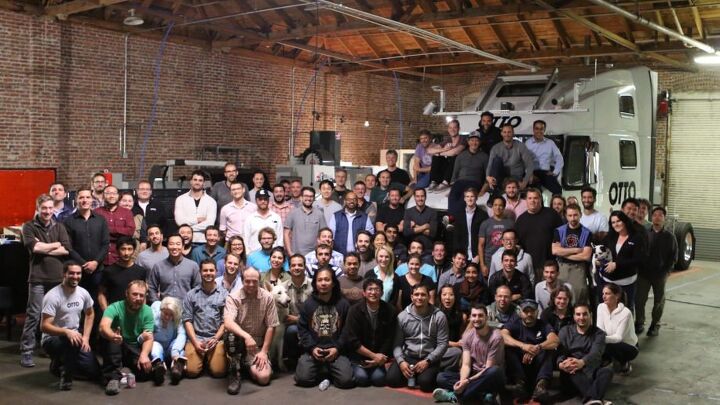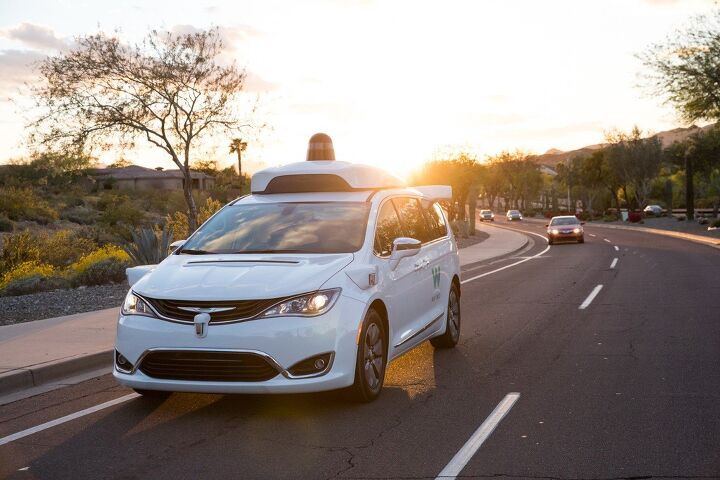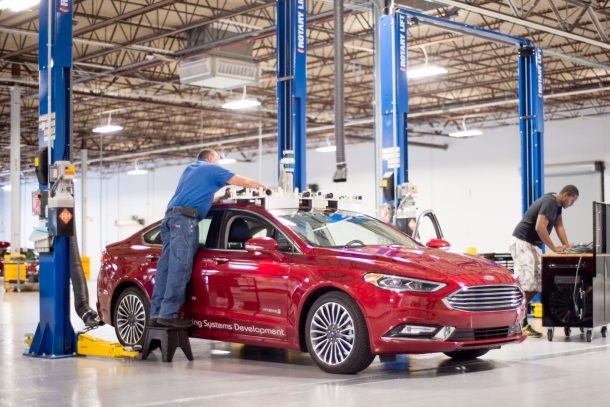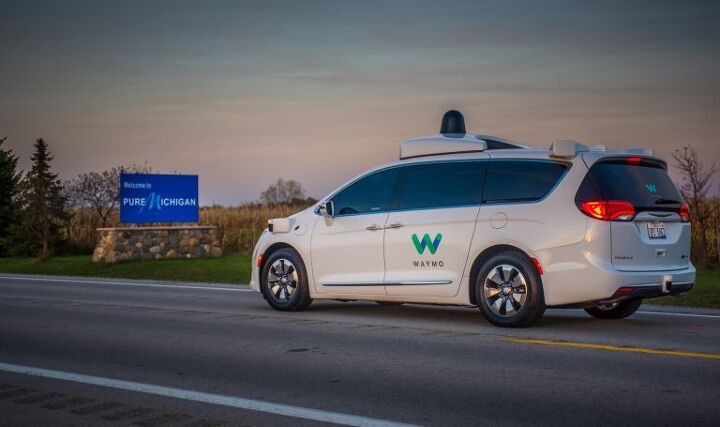#Waymo
Former Uber Self-driving Head Declares Bankruptcy
The former leader of Uber Technologies’ self-driving unit, Anthony Levandowski, filed for Chapter 11 bankruptcy on Wednesday, and it looks to have something to do with the $179 million he’s legally obliged to pay Google. A San Francisco County court decreed the same day that Anthony needs to pay out in order to settle his contract dispute.
In December, it was ruled that Levandowski and Lior Ron violated their agreement with Google when they left the company to start Otto — a rival autonomous vehicle company focused primarily on commercial trucking. Uber purchased Otto in 2017 but Google’s self-driving arm (which evolved into Waymo) claimed Levandowski violated intellectual property laws by stealing trade secrets it owned for Uber. While Ron decided to pay $9.7 million to settle with the tech firm, Anthony held out. He also faces a federal indictment over the alleged intellectual property violation.
Waymo Raises $2.25 Billion in External Funding Push
Waymo CEO John Krafcik announced Monday that his company amassed $2.25 billion in its external investment round. Considering Waymo is owned by Google parent Alphabet, one of the richest companies in the world, you’d think it’d be able to float some extra funding into autonomous development. However, even a company worth an estimated $1 trillion knows it’s better to source capital from outside the business — that must be on the first page of every tech company’s playbook.
Seen widely as the firm currently riding the tip of the autonomous spear, Waymo already operates self-driving shuttle programs (with a safety driver) in Arizona, with plans for expansion. The new funding aims to further those goals; however, with autonomous targets being missed by just about every company that bothered making them, we’ll wait to see what happens. The company is currently focused on getting its Waymo Driver system into more vehicles, starting with EVs and Class 8 trucks.
Waymo Refocuses on Semis, Heads Back to Phoenix for Testing
Alphabet’s Waymo probably operates the most successful autonomous fleet in North America right now. While we can debate its technical prowess versus its rivals forever, it’s still one of the only companies offering a commercial taxi service using autonomous vehicles in North America. It also has an enviable safety record.
The company has also worked on adapting the technology for Class 8 trucks, testing such units previously in California, Atlanta, and Arizona. Recently, the company tweeted that self-driving semis would soon return for more testing in Phoenix — where it runs its Pacifica-based early rider program — as the company places a renewed emphasis on their development.
Waymo Picks Detroit Plant for Self-driving Vehicle Conversions
It’s a long way from the company’s fledgling, Phoenix-area autonomous ride-hailing service, but Detroit has enough available space and local talent for Waymo to sign a lease.
On Tuesday, the self-driving tech company announced a deal to mate Chrysler Pacificas and Jaguar I-Paces with autonomous hardware in an abandoned assembly plant sitting in the heart of the domestic auto industry.
California Gives Ford's Argo AI Green Light to Test AVs
Argo AI, the Pittsburgh-based firm Ford pumped $1 billion into and handed responsibility for educating its self-driving vehicles, just received a go-ahead for testing in the State of California. The company gained a testing permit from the California Department of Motor Vehicles on Tuesday, making its autonomous trials perfectly legal on public roads.
Ford’s current trajectory has its autonomous vehicles entering the commercial market by 2021. That’s two years after General Motors promised to do the same. However, recent events cast doubt over whether GM will be able to meet its self-imposed deadlines (some of which dictate future investments from its partners) and start mass production of computer-controlled cars by the end of this year. It’s not just GM that’s having trouble, either. A critical look into autonomous development shows many companies are struggling with advancing the technology to a point that would make it commercially viable.
The Blue Oval might be better positioned in the autonomous race than initially presumed.
Waymo Promises New Auto Jobs in Michigan
Alphabet’s self-driving arm, Waymo, announced plans for a Michigan expansion on Tuesday. The company is currently seeking a location in the southeast section of the state and intends to hire up to 400 employees over the next five years.
According to a corporate blog post, the new new hires will be tasked with installing autonomous driving systems on vehicles built by Fiat Chrysler Automobiles and Jaguar Land Rover ahead of those vehicles entering the firm’s growing fleet.
“We’ll be looking for engineers, operations experts, and fleet coordinators to join our team and help assemble and deploy our self-driving cars,” the blog explains. “This will be the world’s first factory [100-percent] dedicated to the mass production of [Level 4] autonomous vehicles.”
Guns, Drunks, and Rage: Waymo Self-driving Vans Targeted by Angry Arizonians
Waymo began testing its self-driving Chrysler Pacifica minivans in the Phoenix-area city of Chandler, Arizona two years ago, and the local populace hasn’t left them alone since.
A report in the Arizona Republic describes a multitude of incidents where citizens, apparently enraged by the sight of the Waymo vans, decided to threaten and attack their autonomous invaders. Unbeknownst to many of them, the vans were recording their every move.
Work in Progress: Waymo Van Stakeout Reveals the Challenges of Self-driving Tech
The self-driving Chrysler Pacifica vans operated by Alphabet-owned Waymo didn’t know they were under surveillance, but indeed they were. Reporters from the Arizona Republic were on their tail, watching as the autonomous vans — safety driver behind the wheel — tooled around the streets of the Phoenix, Arizona metro area for a period in October. In total, the rolling stakeout covered 170 miles of sun-drenched roadway.
Earlier this week, Waymo announced it had become the first company to offer a commercial ride-hailing service (“Waymo One”) using autonomous vehicles, even though there’s still a live human being behind the wheel. That employee’s job is to monitor the vehicle and take over if needed, as self-driving tech is still in its early days. There’s bugs to be worked out.
What the newspaper’s surveillance showed was that vehicles operating “by the book” — ie, with a strict adherence to the rules of the road and an abundance of caution — sometimes don’t mix well with humans. Go figure.
Waymo's First Commercial Self-driving Service Launches in Phoenix
We’ve arrived. It’s officially #TheFuture.
After years of talk within the auto industry, Waymo says it will become the first company to offer a commercial taxi service using autonomous vehicles when the program launches in Arizona today. Called Waymo One, the Google subsidiary plans to offer the first batch of rides to the 400 individuals who participated in the firm’s pilot program. Afterwards, the service will be expanded to more riders in a broader area.
As with the company’s early rider program, Waymo wants to keep the launch small to assess demand while continuing the company’s testing in an environment it feels comfortable with. Based on the growing assumption that autonomous vehicles can’t handle inclement weather, Arizona seems like the perfect place to keep working out the bugs.
Similarly, public complaints have indicated Waymo’s fleet of Chrysler Pacificas may not yet be perfected.
What Does Ford Look Like As a Mobility Company?
These days, every automaker is in the midst of a metamorphosis, eager to emerge from their chrysalis as a “mobility company.” Even brands that don’t seem bent on completely revolutionizing their business model now use the term in reference to themselves.
Ford, which has positioned itself as a mobility company ever since Mark Fields was steering the ship, is among those pushing the narrative the strongest. Fields may have been fired for having a lofty, tech-focused vision that couldn’t charm investors, but much of it carried over to Jim Hackett’s tenure as CEO. Ford desperately wants to be seen as a cutting-edge nameplate.
However, the assumption among industry experts is that it’s lagging behind General Motors in terms of autonomous driving, electrification, and the ability to tap into alternative revenue streams. We sometimes wonder how accurate those assumptions are.
Pilotless Pacifica Rides for Paying Customers Are Just a Month Away: Report
Waymo expects to quietly rolls out a commercial, autonomous ride-hailing service early next month, a new report claims, making it the first such service to open itself up to paying customers.
The company, a subsidiary of Google parent Alphabet, has tested a fleet of driverless Chrysler Pacifica Hybrids in Arizona for some time, recently bringing a group of non-paying riders on board for free test trips in the Phoenix area. Now, it’s time for the real show to start, albeit slowly.
Waymo Spins Tragedy Into Triumph for Autonomous Vehicles
Last month, a motorcyclist was injured by one of Waymo’s self-driving Chrysler Pacificas. According to the accident report, a car in the left lane attempted to merge into the same middle lane as the Pacifica test platform, which was operating in autonomous mode. The safety driver then “took manual control of the Pacifica out of an abundance of caution, disengaged from self-driving mode, and began changing lanes into [the outside lane].”
Considering the AV wasn’t traveling above 25 mph, it’s a little curious the driver took evasive action, unless the second car attempted to merge directly into it. Regardless, the Pacifica’s lane change placed it into direct contact with a motorcycle that was moving slightly faster. Waymo said that, had the autonomous system been left in play, the vehicle would have assuredly avoided the accident.
More Evidence That Self-driving Cars Are on a Road to Nowhere
We’ve been critical that self-driving systems are, ahem, “oversold” by automakers and tech firms hoping to boost their stock valuations. That doesn’t mean autonomous vehicles won’t happen, just that the timeline is probably a lot longer than the public has been led to believe. Still, it makes sense to pursue AVs. The first company to achieve legitimate self-driving will blow the hinges off a door leading to an array of new business opportunities.
General Motors, long considered a frontrunner in the autonomous race, is apparently in desperate need of a second wind. Its Cruise self-driving unit is said to be woefully behind in its attempt to bring an autonomous vehicle to the commercial market by 2019. Some GM staffers have confessed that the current system isn’t even capable of identifying whether objects are in motion or not — which seems like an important distinction for a computer-controlled automobile to be able to make.
No Parking Required: Waymo Launches Shuttle Service to Walmart
Remember how everyone talked about autonomous vehicles like they would deliver humanity into a cleaner, safer future where all the disgusting trappings of our past would be a distant memory? It’s not playing out quite like that. In fact, as the reality of self-driving cars inches ever closer, we’re seeing weird corporate partnerships and companies looking to make a buck anywhere they can as the consumer serves double duty as master and commodity.
If you need a present-day example, look no further. Waymo, the autonomous arm of Google parent Alphabet Inc., is launching a pilot program this summer that intends to shuttle passengers to Walmart and other partner locales. Members of the firm’s “early rider program” will be able to catch a ride to the retail outlet after using its online component to place an order (which qualifies them for discounts in the future).
While the goods are being prepared at the store, Waymo will dispatch a self-driving Chrysler Pacifica to the customer in order to bring them to it — sort of like a reverse delivery service. However, Walmart is far from the only corporate partner Waymo has right now.
Japan's SoftBank Dumps Cash Into America's Autonomous Vehicles, Sets GM Deadline for 2019
Several months after procuring a large ownership stake in Uber, SoftBank has placed $2.5 billion into General Motors’ self-driving program. The automaker intends to begin deploying autonomous vehicles next year and CEO Mary Barra says her company will invest $1.1 billion of its own funds into the effort to ensure the timeline is adhered to.
Thanks to the hefty investment from SoftBank’s Vision Fund, the Japanese holding company now owns roughly 20 percent of General Motors’ tech subsidiary, known as Cruise Automation. While tech firms and automakers have been driving hard to surpass each other in terms of autonomous development for years, GM currently appears to have the most riding on the hardware.


























Recent Comments